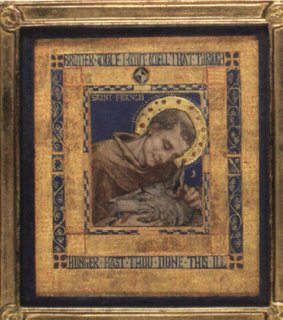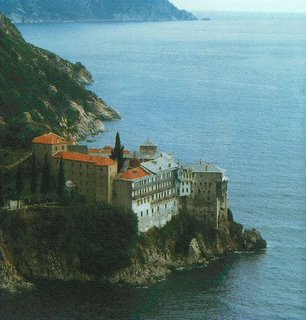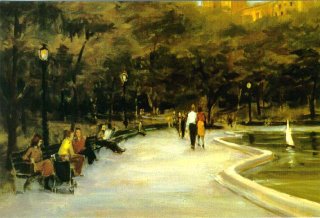 image: shiftingpixel.com
image: shiftingpixel.comI think that the “Cross of Combermere” has something to do with detachment. It seems that this area was picked from the ice age as a place for the cross and thus a chance, a chance for detachment; for as soon as the glaciers scratched their way south, taking almost all the good topsoil with them, and leaving rocky hillsides and blue-eyed lakes, it became a potential place for poverty.
And so it was; when the white men came, these lands were the leavings. Polish and Irish suffered here and became tough in their strange lives of the beautiful and the miserable: and then Catherine and Eddie Doherty came, two people accustomed to wealth, who were now establishing a spiritual center for the ministry to the poor. Then their vision seemed to develop into a deep understanding of Christ and His choice to be poor with the poor. Catherine’s old Russian memories of the poustinikki, men and women who gave all they had to retreat into silence and poverty, began to develop in her soul and she understood that her early visions of helping the poor were just the beginnings. As she established her dreams of silence and union with God, she understood that it must be in the context of poverty: the poustinia of Madonna House, in my mind, are little gateways, chances for the individual to have a taste of the spiritual road to God: a road, where, “The Son of Man has no place to lay His Head”. Walking with the Man of Sorrows is must be on a lowly dirt road, a road empty in the night where one must look for a place to lay for the night, stomach rumbling, feet sore: but heart full.
And so I, with my half-heart: half materialist, half spiritual longing; I, with my torn heart, have played on the outskirts of the true life. I am driving on that dirt road, wondering if I can indeed park my comforts, get out, and walk with Christ. I have not felt strong enough, or worthy. And how I love nice things, love beauty; my eyes have not been blinded enough to the world to see the beauty of God. Here, under the Combermere Cross, I have been mostly afraid and angry. I don’t want to have to be afraid of every bill; I don’t want to have to go to shop at the thrift store. I remember shopping in
However, something inside wants union with God: this has never really changed; and I understand now that it is because He wants this- of all of us. Love desires union. So I have, all my life, done things with half of myself, dragging the other half (which is screaming and threatening dire consequences) in search of the beauty which is beyond sight, of the love which is beyond the capacity of my heart. I believe, too, that this is the condition and desire of every human heart, and remains so. I don’t believe this desire can ever be fully expelled or ignored, but living a torn life causes disorder and unhappiness. A choice must be made.
I look now more closely at what the half which longs for God is doing; and it is easier to look at it here, under the Combermere Cross. No matter where I go, whether we are called to stay here in Barry’s Bay or not, God called us here to be under this cross, and to understand poverty by living in the beginnings of it. Relative to what I have seen around the world, we are rich. But relative to what we are used to, and God knows this, we are poor. We are wimps and God knows it and is merciful to our pathetic crying: but merciful enough, also, to keep moving us closer to the ideal.
I see St. Francis in my mind; the missionaries and saints, and Mother Teresa: and I see a depth of freedom in their lives and actions that is beyond what any king or dictator enjoys. Yet it seems that I am still watching them work out their salvation in Christ- from the car. When Father Terry told me in the beginning of my pilgrimage here, “Welcome to the Edge”- I felt that I was finally getting out of the car- but then I get back in; ride, back out; walk a few steps and get scared.
I finally understood one night, after tears of deep frustration, that it was about detachment. So I went to the church to pray- it was locked, Our Lord inside. I sat in the car, literally, but my heart was outside waiting for the Lord on the road. As I looked at the lonely cross outside the church, I asked Him to begin to teach me about true detachment; and I begin to understand that a person can be as owner-minded and thus prideful about being poor for the sake of the kingdom as he is about having human power and riches. “What a minefield along this road to God”, I thought; “-if I am going to be prideful, I might as well be rich and at least provide well for my children (and myself)!”
Pride is the deep enemy within ourselves against union with God. “He resists the proud”- and how often I have felt this resistance. Poverty, then, is essentially a thing in the soul- and it cannot be an end in itself, or it simply becomes another petty idol, a place of pride, worse than that of the rich because it is under the veneer of spiritual advancement. Poverty is about detachment, of treating nothing as if I own it- because if I own it, I begin to love it; it is a physical extension of myself (Divine Intimacy). I must be detached from things, and this journey along the dirt road of poverty must be essentially a journey where one puts more and more down along the side and continues with less and less (but with more and more room for Christ).
Detachment itself cannot be the end, because then we would be Buddists only, and God wishes more than nothing-ness for us, He wishes to give us Himself. Detachment is the condition under which God can come to us, when we are becoming places where the proportion of our self to His Self matches reality, matches heaven. When we are full of Him, we are most ourselves because we give glory to Him who needs none, but is Glory Itself: and thus, as
The crosses of life, whether they are Combermere Crosses, Santa Cruz Crosses, New York Crosses, or African Crosses, are gateways. They are chances by which we may begin to detach from the beauties and comforts of this life, in order to see God and thus to bring real beauty into the world, a beauty which glories in God and shows others His love: from simple flower gardens to solid family life, to a love of philosophy and literature; like the songs of St. Francis or a beautiful painting done by a happy child, or the halo of light that the journalist Malcolm Muggeridge saw when he visited Mother Teresa’s House of the Dying (Something Beautiful for God).












